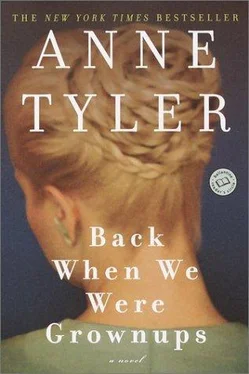“So you can send a list of hotels with the invitations.”
“Um…”
“The invitations to my birthday party, Beck! Where is your mind, these days?”
“Oh. Your birthday party.”
“You know my second cousins will want to come, Lucy out in Chicago and Keith in Detroit. And other people; there must be other out-of-towners, as soon as I think of their names. You’d never have the space for everybody to stay at the house.”
“You telephoned all these hotels yourself?” Rebecca asked. She had unfolded the square of paper and was studying the list — a column of names and numbers printed laboriously with a skippy ballpoint pen. “When did you do this?” she asked.
“After I woke up from my nap. Can we go on our walk now?”
“Yes, of course.” And she refolded the paper and tucked it into her pocket, where it rustled against the list he’d given her earlier.
This spring had been so unseasonably cool that Poppy, from habit, wore his gray V-necked cardigan; but Rebecca didn’t bother with a sweater herself. She had let in enough of the outside world today to know that the weather had turned warm. When they stepped through the door, she told Poppy, “Feel that!” and he tipped his head back and closed his eyes and said, “Ah.” Buttery June sunshine lit his face. The saplings lining the street were a vivid new green, and even above the traffic Rebecca could hear a few birds.
Funny how walking slowly could tire your muscles more quickly than walking fast. She resisted the impulse to point that out to Poppy, though; he would take it for a complaint. Instead she commented on the scenery, which presented itself inch by inch as they proceeded. “Oh, what a pity, they’ve boarded up the blue-gable house.”
“Pretty soon the Open Arms will be the only place not boarded up,” Poppy said.
It was true: this peaceful old street, once the height of elegance, was taking on a sort of toothless look. The house next door had turned into a meditation center, with a banner bearing a mandala flying above the front stoop. Around the corner, dignified mansions sported signs for bail bondsmen, palmists, and cut-rate car insurance. A place with an imposing columned porch was undergoing some kind of remodeling, and when they stopped to investigate they found a placard in the window announcing the arrival of a body-piercing parlor.
“It never reverses, you notice,” Poppy said.
“Pardon?”
“Never changes back into something better.”
“No.”
“Of course when Joe first started the Open Arms, people were none too happy. They claimed he was bringing the neighborhood down.”
“Well, he didn’t have a choice!” Rebecca said. “His father died! How else could he support the family?”
“What he originally set out to do,” Poppy said, “he wanted to make it a tourist home. You remember tourist homes. Now they’re called bed-and-breakfasts and they’re considered very tony, but back then, oh, his mother had a fit. She said, ‘I can’t be changing strangers’ bedsheets! Letting all and sundry spend the night under my roof. Whatever would the neighbors say?’ As I recall, Joe had gone and bought an old sign from some kind of salvage place. HOTEL NO VACANCY, it said. With the NO removable, for whenever they had a room free. But, ‘Over my dead body!’ his mother said. It was Zeb who thought up giving parties instead. Even that kind of went against Liddy’s grain. Better than the Hotel No Vacancy, though, she had to admit.”
Rebecca smiled. “This is the first I’ve heard of that,” she said.
“Oh, you don’t know everything, Miss Beck.”
She took his arm, and they resumed walking. They were overtaken by others, more able-bodied: a boy on Rollerblades, two girls leading a little dust mop of a dog, a middle-aged couple carrying plastic bags of groceries. The couple stayed just slightly ahead; they weren’t talking, but there was something sympathetic and companionable about the way they kept in step with each other, their shoulders gently touching.
Sometimes Rebecca had to fight down the feeling that life had treated her unfairly.
As if he had read her mind, Poppy asked, “Do you ever think of Joe anymore?”
“Naturally I think of him!” she said, almost offended.
“But can you hear his voice in your head still? Or get a flash of how he looked at some certain, particular moment, as if he were still here?”
She tightened her hold on his arm. She said, “Yes, I’ve had that happen.”
“Joycie used to say to me, ‘Oh, hell’s bells!’ Remember how she’d say that? I hear it sometimes just when I’m about to fall asleep. ‘Oh, hell’s bells!’ in that kind of squawking way she had, just as clear! Just as real! Like she’s there in the bedroom. My heart will start pounding.”
“Yes, I know,” Rebecca said.
With her, it was the pressure of Joe’s hand on the small of her back, guiding her across a street.
“Then I say, ‘Joycie, if you’re going to appear from beyond and give me a message, couldn’t it be something more useful than “Hell’s bells?”’”
Rebecca laughed, and they turned at the end of the block and started back toward home.
* * *
Patch dropped by with her youngest — Meredith, aged seven — and asked if she could leave her while she and Jeep went to a ball game. “Certainly,” Rebecca said. “She can help with the party.” She had to shout, because the disk jockey had arrived and was testing his equipment. Deep, throbbing bass notes shook the floorboards. Patch said, “She hasn’t…!” something, something, and Rebecca shouted, “What? Hasn’t what?”
“Hasn’t eaten yet!” Patch said too loudly, speaking into a sudden lull. “Time just got away from us, somehow.”
“That’s okay; we haven’t either,” Rebecca told her. “I’ll give her supper.”
Then the music took over again; so Patch waved instead of saying goodbye.
Back in the kitchen, Rebecca put Merrie to work peeling hard-cooked eggs. “We’re eating upstairs in the family room,” she said. “The party tonight’s extra early.” Deftly, she removed the plastic wrap from one of the catering trays and stole three miniature sandwiches. Then she rearranged the others to cover the gaps. Merrie, meanwhile, picked off tiny fragments of eggshell, catching her lower lip between her teeth. She was standing on the step stool, which made Rebecca think of Biddy tossing the salad so many years ago. Although Merrie looked nothing like Biddy. (She was a carbon copy of Patch, all muscle and bone in sausage-skin bicycling shorts.) But everything else was the same: the ivory metal stool with its corrugated rubber treads, and the chipped and stained sink, and the cupboards so layered with paint that their doors could never quite close.
“I had this really weird dream last night,” Rebecca told Merrie. (And why was it she just then thought of it?) “I dreamed I was on a train with my teenaged son.”
All Merrie said to this was, “ We went on a train. Me and Emmy and Mama. We went on a train to Washington last week. But Danny stayed at home because it was only us girls.”
So Rebecca changed to her grandma voice and said, “Oh, what fun! What did you see? Tell me all about it!”
She loved these children, every last one of them. They had added more to her life than she could have imagined. But sometimes it was very tiring to have to speak in her grandma voice.
She set plates and silver on a tray, poured three glasses of milk, and piled some fruit in a bowl, meanwhile listening to Merrie’s Washington saga. In the back of her mind, though, her son continued traveling. He gazed out at the scenery while Rebecca studied his hands — those oddly familiar hands with the squared-off thumb joints, a pink Band-Aid wrapping one finger.
Читать дальше












